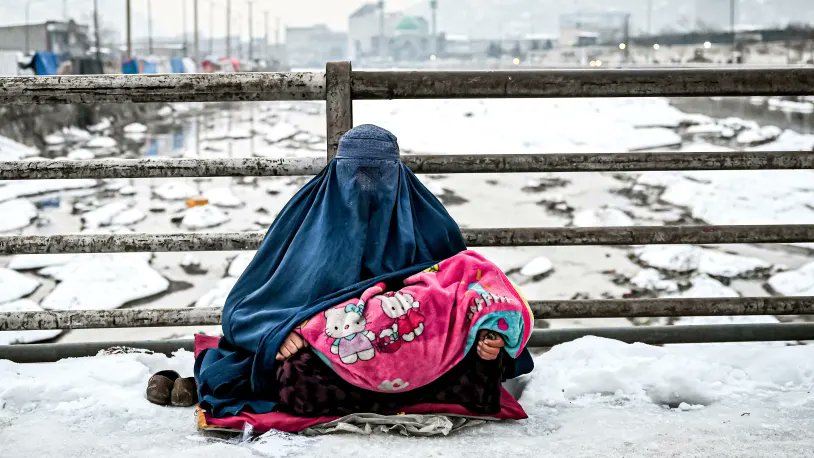AFGHANISTAN: LET THEM EATDr Suhaib Ashraf Bhat
After the Soviets bailed out of Afghanistan in 1989, the U.S. decided that it had little stake in what happened in the country and the region. Virtually all government assistance ceased. America decided to let the Afghans sort out their differences and left Pakistan, erstwhile partner in the jihad against communism, to fend for itself in coping with the fallout of the decade-long Afghan conflict. What America got in Afghanistan was a bloody, anarchic, fratricidal civil war, the rise of the Taliban and the settling in of Al-Qaeda. Please note, Al Qaeda was in Afghanistan before Taliban. All those countries later complaining about them supported them at the time of the Soviet invasion.
Over the past few months, the UN has repeatedly warned that Afghanistan is on the brink of the world’s worst humanitarian crisis. More than half the country is facing “acute” food shortages. According to the UN, almost 24 million people in Afghanistan about 60 per cent of the population suffer from acute hunger, and about 8.7 million Afghans are coping with famine.
Last month, Afghan demonstrators marched through the streets of Kabul towards the US shuttered embassy, calling for the release of billions of dollars in assets frozen by Washington and its allies.
“Our main demand is that the United States should release our assets as soon as possible,” the protest organizer as quoted. “This is the wealth of the nation, not of any single person, group or government.”
The protesters chanted anti-US slogans and held banners reading “Let us eat” and “Give us our frozen money.”
As the harsh winter sets in, situation could be even worse, “The children don’t have warm clothes and it’s becoming very cold. Hunger and destitution seem to kill more Afghans than all the bombs and bullets of the past two decades.
In late December, the UN Security Council and the United States gave aid agencies a green light to scale up life-saving assistance without fear of breaking sanctions. But the point is humanitarian aid is the only a sticking plaster – liquidity must be injected into the economy to revive business, trade and livelihoods, and frozen money released to pay for crucial services.
An increase in poverty is inevitable in Afghanistan. The UN Development Programme reports that 97% of civilians could plunge below the poverty line by mid-2022. According to a local official of the World Food Program (WFP), 60% of those living in the northern provinces of Afghanistan are currently suffering from hunger and this figure will likely increase in the months ahead. Aid organizations such as Doctors Without Borders have warned of an “impending humanitarian crisis.”
There is currently a severe economic crisis in the country. Many civilians, including former employees of NGOs and the previous Afghan government, are either unemployed or have no hope of earning a living.The unskilled and manual labour workforce has now minimal or no income at all. Alarmingly, farmers have suffered losses due to drought, winter is fast approaching and medical supplies are running out in the country’s remote provinces. These incidents take place when the price of raw materials has risen sharply. Millions of children are likely to be malnourished as a result of the growing economic crisis.
Delegates of the 57-nation Organization of Islamic Cooperation (OIC) met on December 19 in a special session in the Pakistani capital of Islamabad to set up a humanitarian trust for Afghanistan as the country faces a harsh winter where millions could starve. The conference was the largest international summit on Afghanistan since the Taliban deposed the US-backed Afghan government in August.
The OIC vowed “to unlock the financial and banking channels to resume liquidity and flow of financial and humanitarian assistance.” Pakistan’s foreign minister Shah Mahmood Qureshi announced the development fund and said it would be set up under the auspices of the Islamic Development Bank, although it’s unclear whether the effort will succeed.
Pakistani Prime Minister Imran Khan warned millions could starve and chaos could engulf the country if the situation is not addressed urgently. “Unless action is taken immediately, Afghanistan is heading for chaos,” Khan said. Khan urged the U.S. to “de-link” aid to the Afghan people from the Taliban government his nation helped install in Kabul. He suggested Western ideals of human rights may not match the reality on the ground and cautioned, “Every society’s idea of human rights is different.”
While concerns mount about the level of crisis facing Afghanistan, the international response has lagged. Western governments are reluctant to assist the Taliban out of fear of providing legitimacy.
In a statement, the meeting’s participants said permitting Afghanistan access to frozen currency reserves abroad would be essential to preventing economic collapse. Representatives from the U.N, U.S, E.U. and Japan all observed the conference. It was left unclear how much the humanitarian fund would hold. Afghanistan’s acting foreign minister Amir Khan Muttaqi told delegates, “We cannot ignore the danger of complete economic meltdown.” More than 20 million Afghans face starvation since the Taliban overran the capital Kabul in mid-August. The near-total collapse of Afghanistan’s banking system has complicated the already intricate matter of delivering humanitarian aid.
It is obvious to everyone that the financial crisis is shaking the entire world, East and West. It is a serious event that is giving the politicians, decision makers, prominent thinkers and economist’s sleepless nights. It is a huge calamity that is very complex and has many implications, which explains the great turmoil being experienced by economists and politicians, and it also explains why so much is being written about it, analysing it from different points of view. They are in a state of great confusion, and some of them have started to blame one another for what has happened.
Poverty is one of the calamities either to a specific person or a family or a society. Poverty has negative effects on people’s beliefs and conduct. Immoral behaviour becomes widespread to a large extent because of poverty, as a means of meeting people’s needs, so theft, murder, prostitution and other harmful things become widespread. Undoubtedly these things have a negative effect on individuals and societies.
When armed conflict breaks out or natural disasters strike, entire communities are affected, disrupting their day-to-day lives and long-term development prospects. Humanitarian aid is designed to save lives and alleviate suffering during and in the immediate aftermath of emergencies, whereas development aid responds to ongoing structural issues, particularly systemic poverty, that may hinder economic, institutional and social development in any given society, and assists in building capacity to ensure resilient communities and sustainable livelihoods. Both humanitarian and development aid are related, and different forms of aid often have both humanitarian and development components.
There is no doubt that the world has an obligation to help. To help any country or any society irrespective of Religion, Creed or Colour, all you need to do is just be human. Just imagine the plight of those small kids right now who don’t have food, accommodation, warm clothes. The world has to support Afghan people and carry out their humanitarian obligations.
Suhaibbhatt85@gmail.com



